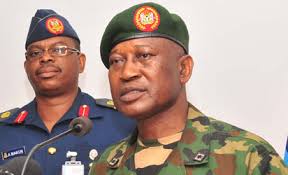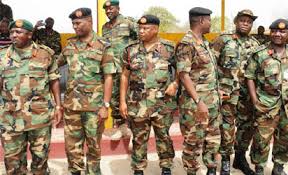The military has strongly rejected a report by New York Times that it failed to act on Pentagon’s “actionable intelligence” from drone flights on information that might have indicated the location of some of the kidnapped Chibok schoolgirls, saying some of the actionable intelligence were “belated or are clearly unrealistic or evidently with suspicious intentions.”
The Director of Defence Information (DDI) Maj-Gen. Chris Olukolade, in a telephone interview with THISDAY on Friday, said all intelligence properly communicated from all genuinely interested sources and partners had always been duly utilised in the operations to locate and rescue the Chibok girls abducted in April by the terrorist Boko Haram sect.
Olukolade added: “One cannot however vouch for the ones that come in when belated or are clearly unrealistic or evidently with suspicious intentions. This was the purpose of the fusion centre which was established and maintained involving all partners in support of the mission.”
Quoting unnamed Africa Command officials in Stuttgart, Germany, the New York Times had reported that shortly after the US offered to help rescue the girls, it flew several hundred surveillance drone flights over the vast, densely forested regions in the North-east (Sambisa forest) where the girls were seized, but officials in Stuttgart said that with few tips to guide the missions, the flights yielded little information, while diverting drones from other missions in war zones like Iraq and Syria.
The lack of result was also blamed on mutual mistrust between US and Nigerian officials: “Although the United States reached an agreement with Nigeria last spring to share some intelligence, American officials did not include raw intelligence data because they believed that Boko Haram has infiltrated the Nigerian security services.”
According to the New York Times, “Soon after the Islamist group, Boko Haram, kidnapped nearly 300 teenage girls in Nigeria in April, the United States sent surveillance drones and about 30 intelligence and security experts to help the Nigerian military try to rescue them.
“Gen. David M. Rodriguez, the top general for American missions in Africa, rushed from his headquarters here to help the commanders in the crisis.
“Seven months later, the drone flights have dwindled, many of the advisers have gone home and not one of the kidnapped girls has been found. Many are believed to have been married off to Boko Haram fighters, who in the past six months have seized hundreds more civilians, including children, planted bombs in Nigerian cities and captured entire towns.”
The newspaper added that the fleeting moment of cooperation between Nigeria and the United States in May had now devolved into finger pointing and stoked the mistrust between the two countries’ militaries.
Nigeria’s ambassador to the United States has accused the Obama administration of failing to support the fight against Boko Haram, prompting the State Department to fire back with condemnations of the Nigerian military’s dismal human rights record.
“Tensions in the US-Nigeria relationship are probably at their highest level in the past decade. There is a high degree of frustration on both sides. But this frustration should not be allowed to spin out of control,” Johnnie Carson, the State Department’s former top diplomat for Africa said in an interview.
In Stuttgart, the New York Times reported, officials at the headquarters of the United States Africa Command offered their own bleak assessment of a corruption-plagued, poorly equipped Nigerian military that is “in tatters” as it confronts an enemy that now controls about 20 per cent of the country.
“Ounce for ounce, Boko Haram is equal to if not better than the Nigerian military,” said one American official, who spoke on condition of anonymity to discuss operational reports.
The violence is in the meantime spilling into neighbouring countries like Cameroun, which carried out its first airstrikes against Boko Haram this week, after militants overran a military base and attacked five villages there.
Despite Boko Haram’s advances, United States Embassy officials in Abuja said Nigeria has cancelled the last stage of American training of a newly created Nigerian Army battalion.
The lack of cooperation was magnified when Maj. Gen. James B. Linder, the head of American Special Operations forces in Africa, visited Nigeria in late October, but was barred from visiting the base where American trainers were instructing the new Nigerian Army battalion created to help fight Boko Haram.
General Linder was left waiting at the gate in what some American officials viewed as another dig at the Pentagon. Africa Command officials insisted it was a “coordination issue that was remedied with a meeting later in the day”.
“We continue to engage with Nigeria on a broad range of training, equipping, and information-sharing projects across all of the military services,” Benjamin Benson, an Africa Command spokesman, said in an email to the New York Times.
Although Secretary of State John Kerry called Nigeria’s President Goodluck Jonathan on Tuesday in part to discuss Boko Haram, the strains between the two militaries are not new, and with Nigeria preparing for national elections in February, US officials fear that earlier assessments may overtake their cautious optimism from the spring.
THISDAY Investigations reveal that prior to the cancellation of the training; several top Nigerian military, security and intelligence personnel had expressed reservation over the motive of the US in particular in the war against terror in the North-east.
Some of them went further to use the botched arms deals and inability of the Americans to offer any concrete information concerning the whereabouts or release of Chibok girls to buttress their long-held suspicion.
Speaking to THISDAY in the heat of the arms saga, a top military General said: “This is alarming; and when you examine this entire saga, you can see a clear effort to tie our hands. Do you know that even when we decided to make some orders from the East (probably China and other Asian countries), since there is an international rules, protocols and convention that any plane or ship carrying arms must inform all countries through which air space it will fly, what we noticed was that efforts were made to frustrate us.
“It is obvious that America has been monitoring our moves and are probably the ones that informed South African Intelligence about this deal, all in effort to frustrate and weaken us, so that they can step in and claim the glory”, the source noted.
On what America stands to gain if the allegations were true, another Senior military officer said “the answer is not far-fetched”, citing the US agitation to demystify the Nigerian military since its astonishing feats in Liberia (once American colony) and Sierra Leone, and as well gain an entry into West Africa through back door (if Nigeria is to be weakened) after being denied a base for AFRICOM.
The General said that the Chibok girls kidnap saga provided the US the perfect entry point into the country with a sole purpose of under-studying the country’s security and intelligence system for their use.
“More of what they are doing here is sabotage and espionage. In fact, they used the Chibok issue as an opportunity to infuse more spies into Nigeria. Have you tried to ask what they have achieved since they came into Nigeria? Have they helped us in any way other than asking us questions that only tend to serve their purpose?
“The more annoying thing is the way they try to ridicule our military and use every opportunity through the media to portray us as weak; even the way they are sending low ranking military officers like captains, majors to come sit down with our generals asking rudimentary questions, while flooding the whole place with CIA’s”, the source noted.
The military officer further warned the Nigerian elite, especially the media and politicians to be wary of American agenda in Nigeria, saying that their aim is to first whittle down the influence of Nigeria in the West African sub-region and then establish their base to dictate policy issues.
“And the best way they can achieve this is to weaken the military and ensure they are demystified. That is why all their talk about the military has been negative. They have only come to bully us, spy on us and not help or cooperate with us as equal partners”, the source noted.
The source further warned about the destabilising effect American intervention was having on the military, citing the case of rising incidences of mutiny mostly from the Battalion 101 in Borno State, trained by the US military
The source continued: “The role of America in Nigerian security situation is becoming dangerous. Do you know that the only Battalion that has mutinied continuously…highly indiscipline and rebellious in this ongoing counter-insurgency efforts are the ones trained by the Americans.
“The problem is that our politicians and media have not been observant to note these covert operations, even the South African arms deal saga could be Americans who punctured it and kept quiet. I want to repeat, more of what they are doing is sabotage and espionage. There is even an intelligence report of financial grants to Boko Haram”.
“The bitterness of Americans is hinged on a lot of things but at the top is our refusal to grant them AFRICOM base, which they are looking for all means to penetrate us. Also, it is traceable to our feat in Liberia, which is literally their colony and since then two things has been on their mind; to understand how we did it, and to demystify our military.”
This Day














